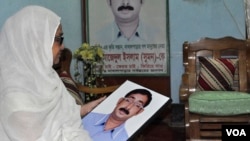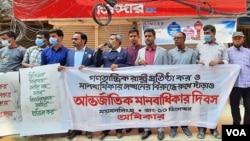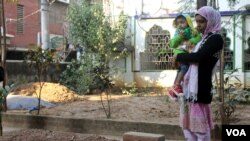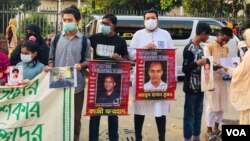Nine global human rights organizations have urged U.N. High Commissioner for Human Rights Michelle Bachelet to publicly call for an immediate halt to serious human rights abuses, including extrajudicial killings, enforced disappearances and torture, in Bangladesh, during her visit to the south Asian nation this week.
Bachelet arrived Sunday and during her five-day visit, she will meet Prime Minister Sheikh Hasina, other senior government officials and representatives of the national human rights commission and civil society groups. She will also visit the Rohingya refugee camps in the district of Cox’s Bazar and meet the refugees, NGOs and local officials, a statement from her office said.
Subjected to ethnic violence in neighboring Myanmar, minority Rohingya Muslims have for decades escaped persecution and economic hardship by fleeing to Bangladesh. More than 1.2 million Rohingya refugees now live, mostly in congested shanty colonies, in Cox's Bazar.
During Bachelet’s visit, the government will seek to “highlight the country’s achievements” in the field of human rights, Shahriar Alam, the junior foreign minister of Bangladesh, said.
In the past decade, international human rights organizations have published dozens of reports alleging that the police, army, paramilitary Rapid Action Battalion, or RAB, and other security agencies in Bangladesh were involved in extrajudicial killings and enforced disappearances. The RAB is an elite force.
According to the Hong Kong-based Asian Human Rights Commission, between 2009 and June 2022, at least 2,658 people were killed extrajudicially and 619 were victims of enforced disappearance.
In December [2021], the United States imposed human-rights-related sanctions on the RAB and six of its former and current officers, noting they were responsible for hundreds of the enforced disappearances and killings.
Bangladeshi authorities deny that the government forces were behind the abuses.
After the global rights groups urged Bachelet to call for an end to rights abuses in Bangladesh, a statement from the country’s foreign ministry Saturday said some “politically motivated” quarters were politicizing the human rights agenda to “put undue pressure” on the government.
“Instead of doing this, everyone should engage in sincere dialogue and cooperation to address the human rights issues,” the statement said.
In an August 10 statement, the nine global rights organizations said, “Hundreds of Bangladeshis have been forcibly disappeared, tortured, and killed” since Hasina took office in 2009.
“High Commissioner Bachelet should encourage the Bangladesh government to create an independent commission of inquiry to investigate all allegations of enforced disappearances, torture, extrajudicial killings and custodial deaths,” the statement said.
Bachelet “should call for an end to the ongoing harassment of human rights defenders and organizations so that they can carry out their work freely and without fear of reprisals.”
The statement from the rights groups also noted how the Hasina-led government has cracked down on opposition political activists and dissidents.
“If the high commissioner fails to clearly condemn these abuses and seek reform, the ruling Awami League could use her silence to legitimize its abuses and undermine activists,” it said.
In her meetings with Prime Minister Hasina, High Commissioner Bachelet should not hold back when discussing the huge human rights problems in Bangladesh, Phil Robertson, deputy director of the Asia division of the group Human Rights Watch, told VOA.
“She must speak up publicly on the myriad human rights abuses committed daily in Bangladesh by the government and its security forces, starting by demanding the immediate dissolution of the rights-abusing Rapid Action Battalion, which has a long history of torture and extrajudicial executions,” Robertson said.
“Bachelet should also strongly press the Bangladesh government to end its harassment, intimidation, arrests and jailing of peaceful political opponents, civil society activists, and journalists who dare criticize the prime minister and the ruling party.”
Families of the victims want Bachelet to raise the issue of the enforced disappearance and extrajudicial killings with the government officials, too.
Afroza Islam Ankhi, a co-founder of Mayer Daak, a platform which represents families of the victims of enforced disappearance, said that the security agencies began threatening and harassing victims’ families instead of investigating the cases impartially.
“The families of the victims began facing an increased level of intimidation after the U.S. sanctions were imposed on RAB. Politicization has destroyed the state institutions like the judiciary, law-enforcement agencies and the national human rights commission. So, the victims cannot get justice,” Ankhi told VOA.
Her brother, a leader from the opposition Bangladesh Nationalist Party, remains missing after he was allegedly abducted by RAB in 2013.
“Now someone as highly placed as the U.N. high commissioner of human rights is visiting Bangladesh and she will meet the Bangladeshi high officials. We hope she will be able to take us closer to justice.”







